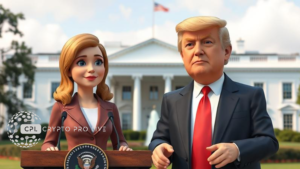In a series of pivotal moves that have captured the attention of investors and crypto enthusiasts alike, the U.S. government has recently implemented significant policy changes impacting both international trade and the cryptocurrency landscape. These developments are poised to influence global markets and the digital asset sector profoundly.
U.S. Imposes 104% Tariff on Chinese Imports
On April 8, 2025, the Trump administration announced a substantial increase in tariffs on Chinese imports, elevating the rate to 104%. This decision came in response to China’s retaliatory tariffs on U.S. goods, which the U.S. Treasury Secretary Scott Bessent labeled a “big mistake,” emphasizing the significant trade imbalance between the two nations. In 2024, Chinese goods imported to the U.S. totaled $438.9 billion, while U.S. exports to China were $143.5 billion.
China’s government has vowed to “fight till the end,” denouncing the U.S. actions as blackmail. The escalating trade tensions have introduced volatility into global financial markets, with investors closely monitoring the potential for a full-scale trade war.
Disbanding of the National Cryptocurrency Enforcement Team
In a parallel development, the U.S. Department of Justice (DOJ) has decided to disband its National Cryptocurrency Enforcement Team (NCET). Established under the previous administration to combat cryptocurrency-related fraud and criminal misuse, the NCET’s dissolution marks a significant shift in the DOJ’s approach to digital assets. Deputy Attorney General Todd Blanche cited the importance of digital assets to economic growth and criticized the prior regulatory approach as overly punitive. The DOJ will now focus on prosecuting individuals engaged in criminal activities involving digital assets, such as terrorism and organized crime, rather than enforcing regulation through criminal prosecution.
Establishment of the Strategic Bitcoin Reserve
Further underscoring the administration’s commitment to the cryptocurrency sector, President Trump signed an executive order on March 6, 2025, establishing the Strategic Bitcoin Reserve and the United States Digital Asset Stockpile. This initiative aims to position the U.S. as a leader in the digital asset space by maintaining government-owned Bitcoin as a national reserve asset and creating a stockpile for other cryptocurrencies. The reserve is intended to elevate the digital asset sector, responding to what Trump described as previous administration attacks. This move signifies a strategic shift towards embracing and integrating digital currencies into the national financial framework.
Market Reactions and Investor Sentiment
The combination of aggressive trade policies and a more accommodating stance toward cryptocurrencies has elicited mixed reactions from the markets. While the increased tariffs have heightened concerns over a potential trade war, leading to market volatility, the disbanding of the NCET and the establishment of the Strategic Bitcoin Reserve have been viewed positively by crypto investors. These policy changes suggest a move towards a more favorable regulatory environment for digital assets, potentially fostering innovation and investment in the sector.
Implications for Crypto Investors
For cryptocurrency investors, these developments present both opportunities and challenges. The U.S. government’s endorsement of digital assets through the creation of a strategic reserve may lead to increased institutional adoption and legitimacy of cryptocurrencies. However, the broader economic implications of escalating trade tensions could impact market stability and investor confidence.
Investors should remain vigilant, closely monitoring policy changes and market responses. Diversification and a well-informed strategy will be crucial in navigating the evolving landscape shaped by these significant policy shifts.
The recent actions by the U.S. government reflect a complex interplay between assertive trade policies and a progressive approach to digital assets. As the situation unfolds, staying informed and adaptable will be key for investors aiming to capitalize on emerging opportunities in the cryptocurrency market.



















